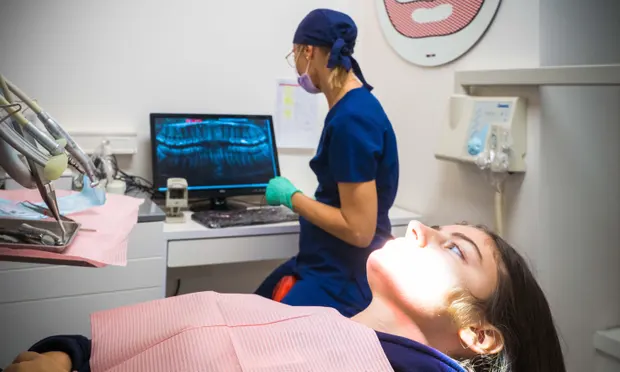NHS dental services are not fit for purpose and need urgent reform, according to MPs who have warned that people are resorting to DIY treatment using pliers.
A report published on Friday by the health and social care select committee said it was “totally unacceptable in the 21st century” that large numbers of patients had to experience pain and distress because they could not see an NHS dentist.
Fundamental changes were vital if people were to receive the dental care they were entitled to, the report concluded.
Figures obtained by the British Dental Association (BDA) in May showed that 23,577 dentists carried out NHS work in the 2022-23 financial year, down by more than 1,100 on the pre-pandemic level and the lowest number since 2012-13. Up to 90% of practices are not accepting new NHS patients.
Despite proposals in the NHS workforce plan to increase the number of dental students by 40% by 2031-32, the cross-party committee concluded that the “government and NHS England have not fully grasped the scale of the challenge for the workforce, and the need to urgently provide compelling incentives to attract new and existing dentists to undertake NHS work”.
MPs also expressed frustration that the government’s recovery plan for NHS dental services, announced in April, has yet to be published.
The Conservative chair of the committee, Steve Brine, said: “Rarely has an inquiry been more necessary than this one. To hear of someone in such pain and distress that they resorted to using pliers to extract their teeth demonstrates the crisis in NHS dental services.
“We register in the strongest terms possible our concern for the future of NHS dental services and the patients who desperately need access to them.”
The current system pays dentists by type of procedure or “units of dental activity”. Instead, MPs recommended that dentists should be paid to maintain and improve patients’ oral health, and focus on long-term, preventive care, with additional support for patients who have greater need.
Experts welcomed the report and called for immediate action. Shawn Charlwood, the chair of the BDA’s general dental practice committee, said the report showed exactly how to “save NHS dentistry”. He added: “Failure to act will condemn this service to oblivion.”
Rachel Power, the chief executive of the Patients Association, said: “Our helpline takes many calls from patients who can’t find an NHS dentist, live in so-called dental deserts where there simply aren’t any NHS dentists, or are bewildered by the charging system.
“Dentists are a fundamental element of good primary care. The current situation should never have been allowed by the government to deteriorate to this point. If the government’s ambition is to ensure everyone who needs an NHS dentist can access one then it needs to take action to make that a reality.”
An NHS spokesperson said: “While the number of dental appointments available for NHS patients is steadily increasing and the GP Patient Survey found seven out of 10 patients had a good overall experience of dental services, the NHS has already started to address some of these recommendations through initial contract changes last year,
“These significant reforms will continue to further support dental teams to carry out even more treatments and address the inevitable backlogs that built up during the pandemic, while record numbers of dentists, dental therapists and hygienists will be trained as part of the NHS Long Term Workforce Plan.”
A Department of Health and Social Care spokesperson said: “We are working to improve access to NHS dental care. We invest more than £3bn a year in dentistry and have already increased the funding practices receive for high needs patients to encourage dentists to provide more NHS treatments.
“We also recently announced a 40% increase in dentistry training places and have amended the guidelines so dental therapists and hygienists can deliver more treatments and will set out further measures to improve access shortly.”


